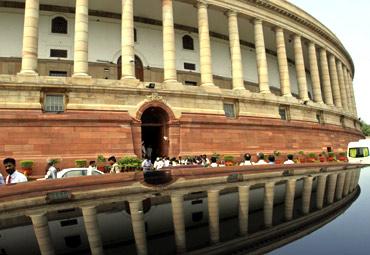
One of the problems that besieged the Lokpal Bill was that it was being considered against the backdrop of the forthcoming assembly elections, which dictated the stand of several parties, reveals Neerja Chowdhury
The behind-the-scenes incidents last Thursday -- when the shameful ruckus in the Rajya Sabha led to the adjournment of the House without voting on the Lokpal Bill -- were as intriguing as the commotion that happened in front of the television cameras.
The Samajwadi Party and the Bahujan Samaj Party cooperated with the Bharatiya Janata Party and decided to vote for some of the BJP's amendments to embarrass the Congress. When the bill had been presented in the Lok Sabha, they had staged a walkout.
But even more intriguing was the cooperation between the BSP and SP leaders. In the plan prepared by the Congress, they had apparently agreed to create a din in the Rajya Sabha, along with Lalu Prasad's Rashtriya Janata Dal, so that the House would have to be adjourned sine die. But at the last moment, they decided to pull back from the strategy and RJD was left alone.
When the SP and BSP did not join the hungama (ruckus) before midnight, the cameras focused on lone RJD MP Rajniti Singh, who snatched the bill from the hands of minister V Narayanswami and went on to tear it. The ensuing incidents were so obviously contrived that they convinced nobody.
Click on NEXT for more...
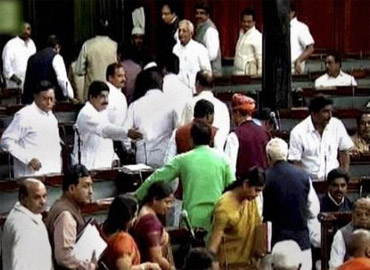
With TV cameras catching every movement and expression of the members of Parliament, it is no wonder that the ruckus angered not just the opposition but everyone who watched the nautanki (drama) on display.
Such has been the animus between the SP and the BSP over the years that this was probably the first time in almost 20 years that they had planned a joint strategy.
Their attempts at "floor coordination" came in the backdrop of the unfolding events in Uttar Pradesh, in the run-up to the assembly elections, where Congress leader Rahul Gandhi has been campaigning intensively and evoking a response.
As for the Congress, the mismanagement by its managers lay not just in their inability to anticipate the SP and BSP's moves. It also lay in leaking the plan of disruption to the media .
Hours before people saw the proceedings in the House on screen, TV channels had 'breaking news' about the plan that had been put in place. It was hardly surprising that most people concluded that the whole show had been "choreographed".
Click on NEXT for more...
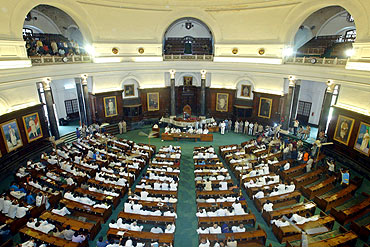
The worrying aspect of what happened last Thursday are the implications of the Congress' action -- that a vote should be avoided by creating a disruption, that too on a legislation as historic as the Lokpal Bill.
The bill has become the symbol of the fight against corruption and engaged public opinion more than any other legislation in recent times.
This may sound far-fetched but tomorrow, a government about to lose a no-confidence motion could resort to a disturbance in the House to prevent a vote and stay on in power for months, though it may have lost majority.
This is not to undermine the odds that were stacked against the Congress. The United Progressive Alliance did not have the requisite numbers in the Upper House. The Congress managers probably hoped that if the BSP, SP and RJD repeated their act of walking out, and if the nominated MPs, some independents and leaders of one-man parties backed them, the bill would just scrape through.
Click on NEXT for more...
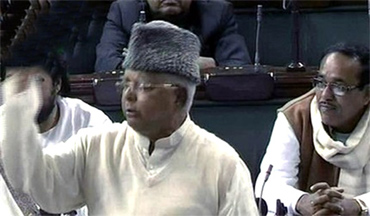
But Trinamool Congress leader Mamata Bannerjee threw a spanner in the works and the Congress could not regain the initiative after that, no matter how many meetings Finance Minister Pranab Mukherjee held to break the impasse.
It seems that at one point, Congress managers were willing to agree to Bannerjee's demand and delete all references to Lokayuktas in the bill. But they decided against such a move when one of the regional party leaders stated that they would find something else to oppose!
Whatever be the public posture struck by these regional parties, they did not want the law to be passed. SP chief Mulayam Singh Yadav and RJD supreme Lalu Prasad had left no one in doubt of this in their speeches in Parliament. They may have played along with the Congress in Lok Sabha by staging a walkout, knowing that the bill was not likely to go through in the Upper House.
Click on NEXT for more...
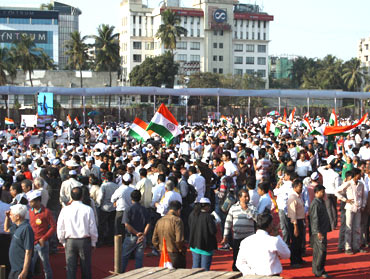
The BJP did not want the bill to be passed either, but it did not want to come across as the party opposing it. The BJP would like the Lokpal pot to keep boiling and piggyback on the Anna Hazare movement to win back the support of the urban middle class and upper castes, which had once supported the party but deserted it for the Congress in the general elections of 2004 and 2009.
The BJP had taken a position supporting the provisions of the Jan Lokpal Bill, but the unprecedented 187 amendments proposed by the party told their own story.
The Congress wanted to pass the bill as it had been cleared by the Lok Sabha, and go into assembly elections with the claim of actually passing that and a slew of other anti-corruption legislations. But the opposition parties did not want the Congress to have the credit of passing the Lokpal Bill.
Click on NEXT for more...
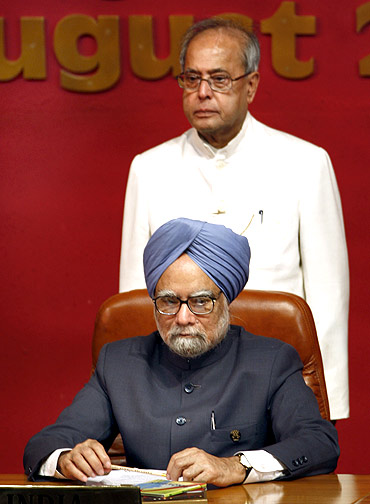
The Congress did not want a vote to take place on the critical amendments -- on the Central Bureau of Investigation and the state Lokayukta -- for fear of being exposed.
One of the problems that besieged the bill was that it was being considered against the backdrop of the forthcoming assembly elections and that dictated the stand of several parties.
The prime minister, who is the leader of the house, could have put all the cards on the table -- that the government had tried but did not have the majority; that it did not want the bill to die; that it wanted time to further consult with parties and study the amendments moved to see if it could accept any of them. The bill could then have been deferred to the Budget session with the concurrence of all.
Instead, Dr Manmohan Singh and Finance Minister Pranab Mukherjee sat through the fracas silently, helplessly watching a spectacle which demeaned our parliamentary democracy.
The upshot: instead of coming across as a victim, the Congress became the perpetrator of an incident viewed as anti-democratic.
Click on NEXT for more...
...